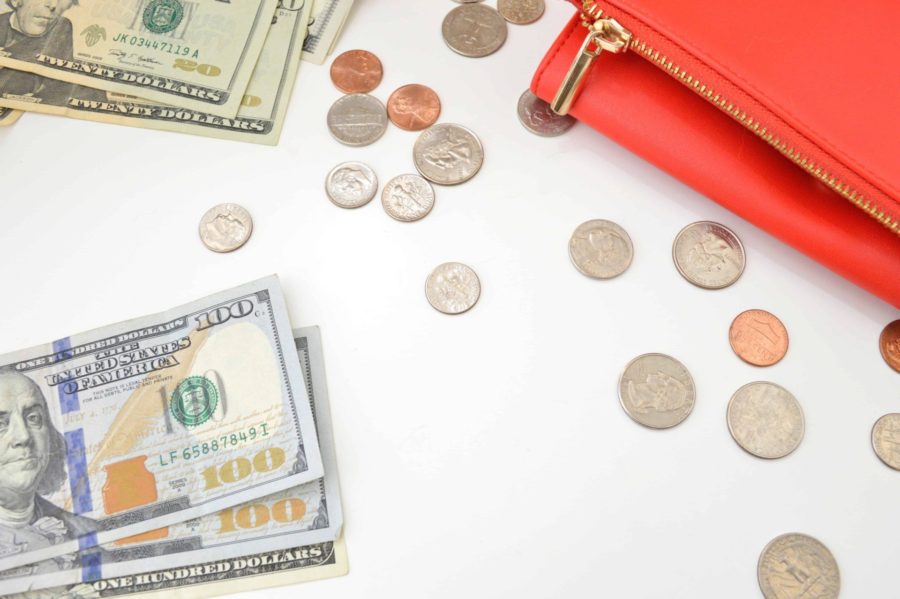How We Escaped Living Paycheck To Paycheck
In this post, I’m going to share my life story. To me, it’s such as an emotional story to tell people how we got out of the living paycheck to paycheck. I never thought that breaking this cycle would even be possible. We went from broke to financially stable. Now I’m a big believer that anything is possible.
It has been almost 21 years since we married. We were young. I was just 21 years old. Shortly after we tied the knot, I started working part-time earning minimum wage at a nearby Chinese restaurant. Later, I got a full-time factory job at a warehouse making a little more than minimum wage. My husband was still in college. And of course, we lived paycheck to paycheck. I was paying for his college and our living expenses. Most of the time, I put in over 80 hours a week to make ends meet.
And it was exhausting. Is this the life I always wanted?
Just to get by and have enough to live?
There must be a better way.
Five years later, I quit my third job and went back to grad school. During those years, I worked full-time and went to grad school full-time.
When my husband and I both finished school, we both had a good job with great benefits. I was a scientist. He was a microbiology laboratory technician. I was so determined to pay our way through school. So we graduated with zero student debt.
There were times things didn’t go as planned; wrecked cars, multiple mortgages, daycare cost, and unemployment. We incurred a TON of consumer debt during these years. They set us back financially and emotionally. However, we never gave up.
We lived paycheck to paycheck for almost 15 years. YES, It was almost 15 freaking LONG YEARS!
And I was sick and tired of being sick and tired of “living paycheck to paycheck”.
It had to stop.
I decided to turn things around
As you can see, we lived paycheck to paycheck for a LONG time, but in the midst of all that, we DID it. We broke the living paycheck to paycheck cycle. On top of that, we were able to get rid of our consumer debt and save money.
Finally, we became completely debt-free (including our home mortgage) 4 years ago.
Two years ago, we bought our dream home. We now have a mortgage again but we also save more money than we did before. We are planning to retire at 50. This is what we did to escape living paycheck to paycheck.
How we stopped living paycheck to paycheck for good
1. I went back to school
Regardless of our financial struggle and push backs from my husband’s family, I insisted to go back to school. So I quit my job and went back to school full-time. It was terrifying to quit my job! My paycheck paid our bills. My husband was unemployed. How in the world would we make it without any paycheck coming in?
I’m glad I quit my job. If I didn’t make that one terrifying decision, I would still be working at that factory today.
During my years of working minimum wage jobs, I saved some money. It wasn’t a lot. It was only 2-months worth of living expenses and one semester worth of my tuition. Somehow we made it. Shortly after I quit my third job, the company I worked for was able to hire my husband in replace of me (I’m so grateful for that!). Later, I was also able to find a full-time job while going to school full time.
In less than 6 years, I managed to earn 2 graduate degrees debt-free. At the time, it appeared to me that grad school was the only way to increase my potential income. My wish came true because I had many great job offers even before I finished my degree considering I graduated in the year of the financial crisis, 2008. I no longer earned minimum wage. My job was very secure and came with great benefits.
If I had some money, I would have started a small business instead. My plan was to have a small storefront selling Asian groceries (as there was no any Asian grocery stores in town. We lived in a small college town where there is a significant number of Asian students. It was a perfect plan.). It seemed so out of reach at the time. So I went back to school instead. I even used a credit card to pay for my first 2 years of grad school. You know, we lived paycheck to paycheck. How could I have thousands of dollars lying around to pay for school? I was terrified!
By the end of my second semester, I was fortunate enough to find a job. I paid my 6 years of grad school and living expenses through working. It paid for my degrees and provided our living expenses.
Going back to school or getting the necessary skill sets can increase your potential income. It works if you do it right. If you’re thinking about going back to school or getting a certificate, make sure you do some research on earning potential and job market demand first. You don’t want to spend years and money on a degree that doesn’t pay.
2. Only spent on absolute necessities
I really mean “absolute” here. You’ve got to pull out all the stops. If you want to get out of the living paycheck to paycheck, you’ll do it. For so long, we had one set of bed sheet, one set of plates (like 5 plates), no furniture, and a handful of clothes. I remember the days when we had friends come over for dinner and we all sat on the floor using a cardboard box as a dining table. For years, we used the same cardboard box as a dining table. We didn’t have a bed until we bought a house. And that was 7 years after we married.
3. Didn’t take expensive vacations
For almost 10 years, we didn’t take a single vacation. Vacationing wasn’t even on our mind, let alone an expensive one.
Looking back to those years that we didn’t have any vacations at all, it’s all worth it. We worked hard and deserved a great vacation. I get it. However, if you don’t have the money to pay for your vacation, you probably feel worse after the vacation is over. The money stress is real. The feeling of making payments on a credit card is also depressing.
We chose to spend time at home gardening and watching movies. On weekends, we enjoyed going to local farms that offer “pick your own …”. In my area, there are apple orchards, blueberry farms, and strawberry farms just to name a few.
During the Fall, we enjoyed hiking and camping. We often made a day or a weekend trip to nearby state parks. Vacations don’t need to be expensive.
Skipping an expensive vacation for a year or two can help you financially. If it cannot wait or you have good reasons to take it while you’re living paycheck to paycheck, then take it. My point is this. As long as you realize you know what you’re doing and you have a plan. It’s okay.
4. Reduce eating out to zero
I can’t remember when the last time I bought lunch or dinner. Yes, it has been that long. During my school years, I never bought food from a restaurant or cafeteria. I always packed my lunch. I also worked part-time at the university dining hall, so I ate for free on the days I worked. On the days I didn’t work at the dining hall, I packed light snacks. I still remember how my classmates always made fun of my lunch.
Fast forward to the present days, married and with a kid, we rarely eat out. Eventually, we stop eating out altogether. We always pack our lunch when we are out and about. When traveling, we always stay at hotels that offer free breakfast and has a kitchenette. When friends ask to go out for lunch or dinner, we simply offer them to come to our house and eat home-cooked meals. Who could say no to a home-cooked meal? Our kid enjoys this lifestyle and we don’t’ miss restaurant food one bit.
I never buy my lunch during workdays either. I still pack my lunch like when I was in school. However, there were times that I had to buy my lunch from the cafeteria because I had visitors at work. Other than that, I never ate cafeteria food and I rarely eat out. This way I save time as well as money on food, drink, desserts, tips, and gas.
With this lifestyle change, money started to pile up in our account. I’m not saying that packing your lunch will make you rich. However, this small change naturally developed us into frugal people. It also became our mindset. We also find ourselves spending more time at home together as a family.
5. Plan our meals in advance
On a weekly basis, we plan what we want to cook or to eat on each day. On a Saturday afternoon, it’s my time to go through the pantry, fridge, and freezer and see what we have. I then plan what to cook and what to put on a grocery shopping list for the week. This way I know exactly what and when to take stuff out of the freezer, what to buy and what not to buy. It takes some planning but it really makes our life less hectic. This way we save money on groceries. And of course, advanced meal planning prevents us from eating out unintentionally. It also helps us eat healthier.
Most people tend to eat whatever they have on hand at the moment. The same holds true when it comes to meal prepping and cooking. You can make your dinner based on whatever ingredients you have. There’s nothing wrong with that. But I’m talking about optimization here. If you plan your meals ahead of time, you tend to better utilize what you currently have in your home more efficiently. This way you know exactly what to buy and not to buy when you do your grocery shopping.
6. Never waste food
According to a study by the USDA’s Economic Research, as much as 31% of food losses at the retail and consumer levels in the U.S. alone. Basically, a whopping one-third of the food supply is sent to landfills each year! This translates to approximately 133 billion pounds or $161 billion worth of food in 2010.
The statistics tell us that Americans waste a lot of food each year. Hence, money is easily wasted through food, and we don’t even realize it!
We never waste food here at our household. And I really mean “never waste food” here. If we still have something left to cook with, we don’t buy more grocery. Also, we don’t cook new food if we still have leftover meals. As always, we use “ALL” parts of the vegetables. Nothing is wasted. If we can’t eat it, we compost it.
7. Save our raises
When we get a raise, we pay ourselves first. We increased our retirement contribution at work. Then, we eventually maxed it out. After that, the difference went to our debts. Later, it went to our savings account as an emergency fund. The “save our raises” mindset makes us keep on living the same lifestyle. Lifestyle inflation hurts your finances if you just keep increasing your spending as your salary goes up.
Getting out of the living paycheck to paycheck cycle didn’t happen overnight. For us, it took almost 15 years of saving our raises and living the same lifestyle to be able to get out of this cycle. Each year, when our salaries went up, we changed the retirement contribution amount. Later, all the difference went straight to debt. And now we put the difference in our brokerage account. We went from barely contributing anything to our retirement plans at work to maxing out the IRS contribution limit and to regularly investing outside of work.
Imagine if you keep spending more as you make more, you wouldn’t get a chance to get ahead financially. Save the difference and use that money for debt payment, an emergency fund, retirement savings, or get yourself out of the living paycheck to paycheck.
8. Track our spending and income
I didn’t realize the importance of tracking our spending and income. These 2 metrics are equally important. For the longest time, I thought being good at budgeting and saving money were the only ways to break the living paycheck to paycheck cycle. Tracking these 2 metrics can truly motivate you to get out of this cycle.
I can’t express how much of an impact tracking our spending and income has done to my family. It helped us get out of nearly $100,000 of debt, the living paycheck to paycheck and achieve financial security. I’ve been using this free online platform called Personal Capital and I totally love it. It pulls all of my financial accounts (checking, savings, retirements, investments, etc.) into one place and is super user-friendly. I used to put everything on a spreadsheet and it took a hell of a lot of time. Now I just login into my personal capital account and everything is presented on interactive fancy charts. Most importantly, it motivates me to increase our net worth. Personal Capital not only tracks your spending and income but also provides great tools for evaluating investment fees and predicting your portfolio. The best thing is that it’s totally FREE.
If you are not on Personal Capital yet, I highly recommend you check it out.
Small steps make a big impact
All of these things I talked about has shaped us into frugal people. We’ve done this for quite a long time and now it has become second nature to us. Now that we escaped living paycheck to paycheck, we still keep on doing a majority of these frugal habits.

Start with small steps and keep at it. It might not seem significant, but trust me it adds up. Just like having debt or making an impulse purchase, living paycheck to paycheck is one to those financial habits that can be hard to break. It takes discipline, patience, and time. It took us a long time, YEARS, to break the cycle. However, it’s possible. It’s up to you if you want to start making changes. I really love this quote by Lao Tzu. Here again, a journey of a thousand miles begins with a single step.
Summary
Sometimes, all it takes to break the cycle is to feel uncomfortable. In order to improve and to grow, you need to get uncomfortable. Had I stayed in my comfort zone and was too afraid to quit my previous jobs, I wouldn’t have the chance to earn more money and I would still be making minimum wage. And of course, we would still be living paycheck to paycheck.
Remember, whatever steps or actions you take, you don’t have to do it forever. This is temporary. Once your finances are in order, you decide what you want to do with the extra money you have.
Hopefully, this post gives you an idea as to how we did it. We can all break the living the paycheck to paycheck cycle. The financial peace of mind it brought us is worth a million dollar. It feels GREAT. I feel like I’m in control of my own finances. Instead of my money telling me what I can do, now I tell my money what to do.
I moved to the U.S. 21 years ago with $100, the clothes on my back and a backpack. English is my third language. I didn’t even understand what people say at first. I didn’t even know how to say hi or respond to a simple question. With all these setbacks, I had to work harder – A LOT HARDER. Everything was so freaking hard. I’m not telling you just so to make me look good but I wanted to point out that it can be done. If I can do it, you can too.

Are you living paycheck to paycheck?
Do you want to escape this cycle?
What prevent you from stop living paycheck to paycheck?
What is a small step you want to take today?
How did you stop living paycheck to paycheck for good?








